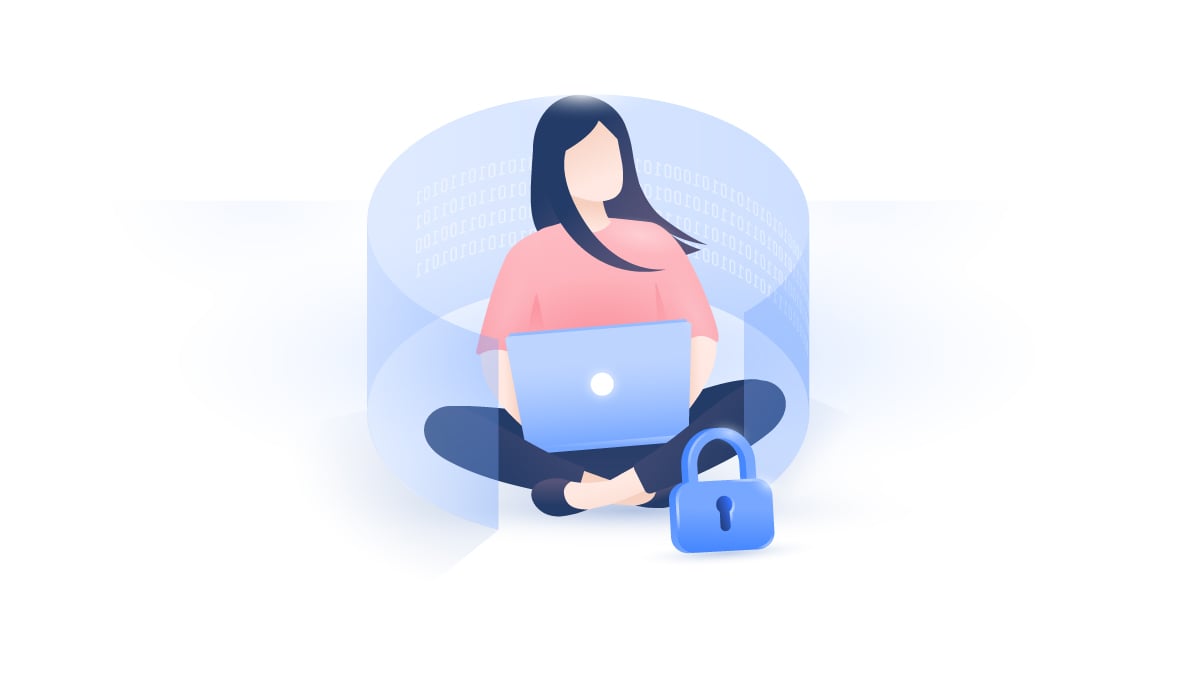Why data privacy is important
Who owns your data? From corporations to criminals, there’s no shortage of people trying to access the information you generate online. Many feel unable to protect themselves from companies like Google and Facebook, but it doesn’t have to be a losing battle. Understanding data privacy and security is the first step to maintaining your digital autonomy.

What is data privacy?
Data privacy is how we choose to maintain our privacy online, where information is a highly sought-after commodity.
It’s important to know who is viewing our activities online and what they’re doing with that information. Allowing larger companies to track and store your data can have unexpected consequences, so you should have a say in the matter.
It’s easy to focus on the dangers of hackers and malicious actors, but that’s only half the story. Protecting your privacy can be just as important as maintaining your data security.
Security VS Privacy
It’s worth defining the difference between “data security” and “data privacy”. Though similar, these concepts are different:
- Data Security is the protection of data from criminal activity and deliberate hacks.
- Data Privacy covers how data is legally gathered, stored, and used.
It’s easy to focus on security, since the dangers involved seem more pressing. Cyberattacks are on an unprecedented rise right now. From phishing to password cracking to IP spoofing, there are a lot of strategies that hackers can use to steal your data.
Data privacy laws
The extent to which your data is legally protected varies depending on where you are. Even within one country – the US, for example – your right to privacy may change depending on the region in which you operate.
The European Union has enacted legislation across all its member states, although individual countries have developed their own standards on top of this. The General Data Protection Regulation law (GDPR) is at the heart of the EU’s privacy controls.
In contrast, US legislators have taken a much more decentralized approach. Laws protecting citizens’ data are enacted and enforced through federal bodies (most notably the FTC) and state legislators.
On the national level, laws like the Federal Trade Commission Act allow government bodies to take legal action against corporations that engage in “deceptive practices”, but this is an intentionally open-ended term that leaves room for further interpretation. There are more specific regulations at the state level. This means that data protection laws will vary in focus and efficiency from one jurisdiction to the next.
That’s why it’s important that internet users in the US are fully aware of their rights within their specific state, and take the necessary steps to protect themselves.
Who can access your data?
Data is valuable. Information on users and their online activity is an important commodity. Everyone from Facebook and Google to minor app developers depends on it for revenue. Even your internet service provider – the company that you pay for your connectivity – probably monetizes your data.
Once you’ve given away your data to one company, it’s very hard to limit its use. While you might feel comfortable with Amazon or Facebook using your personal information, you just can’t be sure that other “third-party” companies and even government agencies won’t also find ways of access it.
There are three key ways you can lose control of your data privacy:
- Third party apps. 2018’s Cambridge Analytica scandal highlighted the threat to privacy posed by third-party apps. Applications often allow users to log in via Facebook or other social media sites, instead of creating an account. It’s a feature employed by everything from Tinder to Uber Eats. In practice, this means giving the application access to some of your social media data. It’s hard to know just how much information you’re giving up, though – in the case of Cambridge Analytica, the company leveraged this mechanism to illegally gain data on more than 50 million Facebook users.
- Government surveillance. Facebook was just one of many companies that participated in Prism, a US surveillance program. Although they denied any knowledge of this, the social media giant was named along with Google as a participant in leaked government documents. According to these leaks, Prism has collected data directly from the servers of communication companies that joined their program, without users knowing.
- Data breaches. Another issue is that sites like Facebook and Google will often store user data, even after someone has deleted their account. If you’ve used Facebook’s payment systems, your card details will still be in their logs. One major problem with this is that, long after you stop using an application, a data breach can still see your personal information in the hands of hackers and criminals.
Many internet users report feeling helpless in the face of these tech giants, but that doesn’t have to be the case. There’s plenty you can do to empower yourself and level the playing field.
Stay private, stay secure
Here are some simple methods for protecting your data and improving online security and privacy:
- Monitor your settings on social media. Facebook, Twitter, Instagram, and other social media sites will usually have a privacy section in their settings. These platforms are made to siphon off your data, but you can still try to reduce what they take as much as possible. Find out exactly how much Facebook knows about you.
- Remove your information from data broker sites. Data brokers are companies that gather information on internet users and list these details on databases for paying customers to access. Advertisers can buy records from data brokers to help with targeted marketing campaigns, and some websites allow individuals to buy access to their data as well. Data brokers are required to remove your records from their sites if you request that they do so. For example, you can lodge a Spokeo opt out request through their website, or by emailing the company directly.
- Use different login information for separate online accounts. If your data is the treasure inside a series of vaults, the keys to those vaults are your passwords. Most internet users have multiple accounts on different platforms: email, streaming,online banking, and social media, to name a few. If you use the same password for all your accounts, a hacker only needs one key to access every vault. Use different passwords on every account and change them regularly. Here’s how to make a password that’s easy to remember.
- Use a VPN whenever you connect online. For genuine all-round data protection, encryption is the best option. The simplest way to do this is with a VPN. This service establishes an encrypted tunnel between your device and a secure server, hiding passwords, personal data, and all online traffic. Even if someone hacks the connection, all they’ll have access to is an indecipherable encrypted code. Better yet, your internet service provider won’t be able to sell information about your browsing habits to advertisers. This is probably the safest way to ensure that your data is under your control. NordVPN also has the Threat Protection feature that helps you identify malware-ridden files, stops you from landing on malicious websites, and blocks trackers and intrusive ads on the spot. And with NordVPN, you can benefit from Meshnet, a feature that allows you to access devices remotely.
Understanding data privacy allows you to take control of your online presence. It empowers you to push back against the massive tech giants that have hitherto been able to harvest data without restrictions.
Want to read more like this?
Get the latest news and tips from NordVPN.
